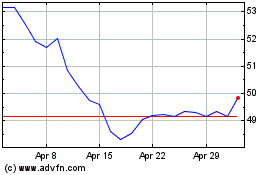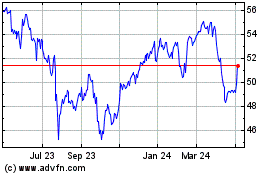Keystone Pipeline Cancellation Raises Pressure on Canadian Producers
January 22 2021 - 1:51PM
Dow Jones News
By Vipal Monga and Collin Eaton
TORONTO -- President Biden's revocation of a permit for TC
Energy Corp.'s Keystone XL pipeline is raising pressure on Canada's
energy industry to seek new markets for oil and gas, its top
export.
Mr. Biden revoked the Keystone XL permit on Wednesday, hours
after taking office, effectively shutting down a 12-year,
cross-border project that would have carried 830,000 barrels a day
from Alberta to Nebraska and eventually to refiners on the Gulf
Coast. His executive order, which fulfilled a campaign promise,
cited concerns about climate change.
Canada, the world's fourth-largest oil producer, is left with
fewer options to get its dense, sticky crude from landlocked oil
sands to U.S. refiners. Canada and industry executives are also
working to counter claims that tapping oil sands is more damaging
to the climate than some other types of oil. They say Canadian
producers have lowered carbon emissions by using less coal-fired
power and more renewable energy to run their operations, among
other steps.
Chris Bloomer, president of the Canadian Energy Pipeline
Association, a trade group, said Mr. Biden's decision didn't take
into account the work the Canadian industry has done to reduce
emissions. "Obviously, it's very disappointing," he said.
Canadian Prime Minister Justin Trudeau said Wednesday that he
was disappointed with Mr. Biden's decision, but he also offered
support for the U.S. president's commitment to fight climate
change. Mr. Trudeau has set plans to reduce carbon emissions over
the next three decades, including a proposal for an increased
carbon tax.
Mr. Biden's decision to block Keystone XL won't immediately hurt
Canada's oil industry because production and demand have fallen
during the Covid-19 pandemic. In recent years, producers have
increased the amount of crude transported to the U.S. by rail,
traders said, reducing the need for Keystone XL.
But the likely demise of the project has underscored how reliant
Canada remains on the U.S. to export its crude. Canada's proven oil
reserves are third in the world behind Venezuela and Saudi Arabia,
according to the Canadian government, but much of what it pumps is
sent to refiners in the U.S., which buys 98% of Canada's oil
exports.
Canada's energy industry is pushing for more access to growing
markets in China and India, pinning hopes on the completion of a
pipeline next year that would extend from Alberta to the Pacific
coast. Keystone XL's failure makes the Trans Mountain pipeline even
more important, said Matt Murphy, an analyst with Tudor, Pickering,
Holt & Co.
Enbridge Inc., meanwhile, is working to replace a pipeline in
northern Minnesota by later this year. The revamped Line 3 will add
370,000 barrels a day of export capacity from Canada to Superior,
Wisconsin, according to research firm Rystad Energy.
Because Canadian producers have such limited and costly options
for getting their oil to buyers, it trades at a discount to global
benchmarks. The Western Canadian Select grade of dense crude that
is extracted from oil sands was trading at $39.30 on Thursday,
$13.70 below the West Texas Intermediate benchmark, according to
S&P Global Platts.
Trump administration sanctions on Venezuela and Iran and
production cuts by the Organization of the Petroleum Exporting
Countries have also raised the price of heavy crude from overseas
and increased the attractiveness of Canada's cheaper crude in the
U.S.
Refineries in the U.S. aren't clamoring for the Keystone XL
pipeline because its additional capacity would have eased the
logistical bottleneck that makes Canadian crude one of the most
profitable varieties for U.S. refiners, traders and analysts
said.
U.S. refiners have consumed more Canadian crude in recent
months. According to the Energy Information Administration,
Canadian exports of crude oil totaled nearly 4 million barrels for
the week ending Jan. 8, up 2% from a week earlier and comprising
56% of all imports into the U.S.
--Paul Vieira in Ottawa contributed to this article.
Write to Vipal Monga at vipal.monga@wsj.com and Collin Eaton at
collin.eaton@wsj.com
(END) Dow Jones Newswires
January 22, 2021 13:36 ET (18:36 GMT)
Copyright (c) 2021 Dow Jones & Company, Inc.
TC Energy (TSX:TRP)
Historical Stock Chart
From Mar 2024 to Apr 2024

TC Energy (TSX:TRP)
Historical Stock Chart
From Apr 2023 to Apr 2024
